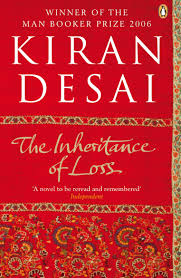The Inheritance of Loss is a novel by Kiran Desai, published in 2006. It won the Booker Prize that year and is widely praised for its exploration of themes such as immigration, cultural identity, post-colonialism, and the generational divides between tradition and modernity. The novel is set in the Indian Himalayas and is told through a series of interconnected narratives, primarily focusing on the lives of several characters who are grappling with the legacies of colonialism and the search for identity in a rapidly changing world.
The central characters of The Inheritance of Loss include:
-
Biju: A young man who leaves India to work as an illegal immigrant in New York City. His story explores themes of displacement, the desire for a better life, and the alienation that comes with being an outsider in a foreign country.
-
Sai: A young girl raised by her grandfather, Jemubhai, who lives in a crumbling colonial-era mansion in the mountains of northeastern India. Her story examines the effects of colonialism on the older generation and the tensions between tradition and modernity as she navigates her own path in life.
-
Jemubhai Popatlal: A retired judge who once lived in England and represents the older generation’s experience of colonialism. His memories of colonial rule and his deeply ingrained sense of inferiority and anger towards his own country and people are central to his character’s arc. His relationships with Sai and others reflect the scars left by colonial history.
The novel's narrative weaves between these characters' stories, which are set in both India and the United States, and it paints a complex portrait of post-colonial life. Through the experiences of these characters, Desai examines the idea of “inheritance” on multiple levels: the inheritance of colonial history, the inheritance of cultural identity, and the inheritance of personal and familial trauma.
In particular, Desai addresses the challenges of globalization and the impact of migration on identity. Biju’s struggles in New York City as an undocumented worker show the harsh realities of immigration, while Sai’s experience in India reflects the complex dynamics of class and the clash between the colonial past and the rapidly changing India of the present. The novel’s setting in the Indian Himalayas, with its picturesque yet tumultuous backdrop, serves as a metaphor for the tensions between tradition and modernity, as well as the natural and political struggles faced by the characters.
One of the key themes in The Inheritance of Loss is the tension between the old and the new, particularly in the context of post-colonial India. The characters are caught between the legacies of British colonial rule and the new realities of an independent, globalized world. This is most evident in the character of Jemubhai, whose anger and bitterness towards India are rooted in his experiences as a colonial subject. His disillusionment with both the British and the Indian ways of life speaks to the deep and lasting wounds left by colonialism.
Desai’s writing is rich and atmospheric, blending humor, melancholy, and social critique. Her vivid descriptions of the natural world and the inner lives of her characters help to create a multi-layered narrative that grapples with issues of identity, belonging, and the impact of history on the present.
The Inheritance of Loss is a novel that explores the complexities of identity, the consequences of colonialism, and the search for meaning in a fragmented and often painful world. Through its richly drawn characters and thought-provoking themes, the novel paints a compelling portrait of the effects of globalization and migration on individuals and communities.
Would you like to explore a specific character or theme in more detail, or perhaps discuss how the novel addresses the intersection of post-colonialism and globalization?












